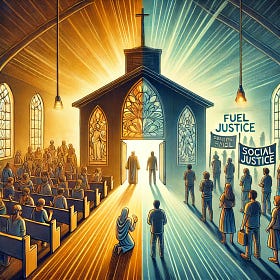Progressive Values vs. Progressive Ideology
As I continue working toward a fuller critique and examination of some elements of Progressive Christianity, I want to take a moment to differentiate—at least as I see it—between Progressive values and Progressive ideology. While these terms are often used interchangeably, I don’t believe they mean the same thing, and understanding this distinction is essential for the church today.
In his podcast interview with Martha Tatarnic on Future Christian, Peter Elliot observed that many people attribute the decline of Mainline Protestantism to its embrace of what he called “Progressive values.” These include commitments to LGBTQ inclusion, women in pastoral leadership, pro-choice stances on abortion, and similar positions.
Let me be clear: I do not believe that these Progressive values are the reason why Mainline Protestantism is experiencing decline. For one, Christianity is in decline across the Western world for a host of reasons, many of which have little to do with theology or values. But more importantly, I don’t think people are leaving Mainline Protestantism because they’re outraged about ordaining women or similar commitments.
So, if Progressive values aren’t the problem, what is? My argument is that the issue lies in how Mainline Protestantism has framed these values—not as deeply rooted in scripture and tradition, but as aligned with Progressive ideology. This distinction is critical. I believe Progressive values come from the Bible, not in spite of it.
The Gospel as Left-Resonant
Two recent books I’ve read—A Guide to Progressive Church by Clint Schnekloth and Faithful, Creative, Hopeful by Jesse Zink—strengthen this point and are well worth reading. Schnekloth puts it this way: “The gospel is ‘Left-resonant’” (6). He goes on to caution that “the problem with Christian progressives abandoning a faith commitment… is then they no longer have any theological perspective that provides support for their actions and teachings.”
This resonates deeply with me. When Progressive Christians disconnect their values from scripture and theological tradition, they lose the grounding that makes their commitments distinctly Christian. Schnekloth’s insights reminded me of similar themes in Zink’s book, where he writes, “Rather than being enervated or out-of-touch, I find that what the Christian faith can offer the world is ideas, practices, and ways of being that point the path toward a fullness of life that to many people no longer seems possible.”
Eschatology and Action: Grounding in God's Timeline
Both authors also offer a nuanced and faithful understanding of eschatology and human action. They emphasize that Christians have a role to play in God’s work but that this role is part of a larger divine timeline. As Zink writes, “Eschatology places Christians on a timeline of God’s action, looking back to what God has done in the past, looking around to what God is doing in the present, and looking forward to what God will do in the future” (87).
This perspective offers a vital corrective to an overly individualistic or ideology-driven approach. It reminds us that Progressive values—such as LGBTQ inclusion, the full equality of women in leadership, and a more just and equitable society—are not rooted in political ideology but in the biblical narrative of a God who is on a mission to reconcile all things. These values are faithful expressions of a God who, through Jesus, is continually working to restore broken humanity to wholeness.
The Risk of Misplacing Our Foundations
When we misplace the foundation of our Progressive values—when they are grounded in ideology rather than scripture and tradition—we risk making Christianity and the church irrelevant. Without the anchoring of the Christian story, the church becomes just another organization advocating for justice, indistinguishable from countless others. And in that case, many will ask: why bother with the church at all?
The distinctiveness of Christian values is that they are not merely "good ideas" or moral imperatives; they are the fruit of a life shaped by the gospel, by the witness of Jesus, and by the ongoing work of the Spirit. They stem from a tradition that has always sought to reconcile and restore, to bring wholeness to the broken, and to embody God’s love in tangible ways.
This is why the foundation matters. Progressive values are not simply Progressive—they are biblical, rooted in the ongoing mission of God. To lose sight of this is to lose the theological grounding that gives these values their ultimate meaning and power.
Looking Ahead
There’s more to say on this topic, and I’ll expand further in my upcoming posts. For now, I hope this offers a starting point for thinking critically about the distinction between Progressive values and Progressive ideology. My belief is that by rooting our commitments in scripture and the Christian tradition, we can not only remain faithful but also offer a compelling witness to the world—one that points not to ourselves or an ideology but to the God who is reconciling all things.
Stay tuned.
Why Worship and Discipleship Must Come Before Activism
I’m working on a bigger post about the influence of progressive ideology/theology within Mainline Christianity, but after reading recent post by Ben Crosby, I wanted to to sort of setup my lengthier post this way.







In general, I tend to agree with you. The Gospel can be “Left-resonant”, but there are also ways in which the Gospel is a conservative message. Schnekloth’s problem is that he refuses to acknowledge that latter fact.
A successful congregation, and church body, will be both welcoming to people who have a progressive viewpoint at the same time as welcoming to conservatives who push back against change for its own sake. It will challenge conservatives to find when the Gospel calls us to be more progressive, but will also challenge progressives to recognize when they are losing the Gospel in their desire to be prophetic — i.e., not every so-called prophetic voice carries a Gospel-centered message. Sometimes the local community needs the comfort that comes with tradition and stability.
Once we start learning to live with each other and our differences within the Christian community, we will be one step closer to living out the Gospel truth as a Christian community, recognizing the need for both prophetic voices “afflicting the comfortable” as well as the more traditional priestly voices of “comforting the afflicted.”
"I believe Progressive values come from the Bible, not in spite of it."
Then you have utterly failed to support that absurd claim. The affirmation of sexual immorality and elective infanticide are certainly NOT Biblical, they are outright contrary to it.